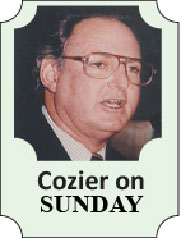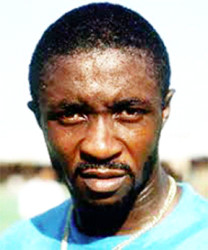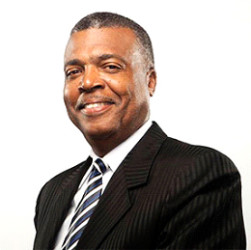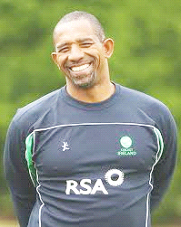Andy Roberts posed a pertinent question in the aftermath of Phil Simmons’ suspension as West Indies coach.
Why the rush to install Eldine Baptiste as interim coach for the tour of Sri Lanka?
The pioneer of Clive Lloyd’s fast bowling arsenal more than three decades ago and himself a former team coach wanted to know.
Simmons was charged with “breaches of confidentiality and bringing the West Indies Cricket Board (WICB) into disrepute.”
The board stated that it had been advised by the management that the responsibilities of the head coach would pass to Baptiste “until the matter is cleared up.”
It noted that he was already assigned to Sri Lanka as the selector-on-tour, hinting that it was a money-saving arrangement.
 Yet Stuart Williams, the assistant coach, is also there. He filled in as head coach for the tour of South Africa and the World Cup following the sacking of Ottis Gibson just over a year ago while the WICB waited for Simmons’ availability at the end of his eight, highly acclaimed years with Ireland.
Yet Stuart Williams, the assistant coach, is also there. He filled in as head coach for the tour of South Africa and the World Cup following the sacking of Ottis Gibson just over a year ago while the WICB waited for Simmons’ availability at the end of his eight, highly acclaimed years with Ireland.
The remainder of the coaching staff, Andre Coley and Curtly Ambrose, is also there.
The indication is that, if the Simmons matter is not “cleared up” within the WICB’s deadline of seven working days, Baptiste would be ready to take over. It is known that he had initially applied for the job that eventually went to Simmons; his coaching credentials include his time in charge of the Stanford All Stars in their US$20 million victory over England in 2009, a brief period with Kenya, stints with a couple of South African provinces and, laterally, in charge of the Leeward Islands.
The Antiguan all-rounder had 10 Tests with the invincible West Indies team of the 1980s and, apart from the Leewards, also played for two South African provinces and Northamptonshire in the English county championship.
He was one of the three selectors, along with Courtney Walsh and Courtney Browne, who thwarted the efforts of Simmons and panel chairman Lloyd to reinstate Dwayne Bravo and Keiron Pollard to the ODI squad. His elevation, brief as it may be, strengthens his status in the hierarchy of the West Indies team. As he starts from scratch, his relationship with the players is necessarily short of those established by Williams over time and, already, by Simmons.
Roberts’ other point was that, if Simmons felt as strongly as he did over the issue, he should have resigned before releasing his exasperation and anger to the media on the eve of the team’s departure for Sri Lanka.


Simmons said then that even “an exceptional speech” to the selectors by Lloyd, their chairman, explaining why he felt it was time the two were back in the squad, could not shift the defiant three. It was a significant u-turn by the former West Indies captain who headed the same panel that dropped them in the first place, a decision he had strongly defended.
Simmons claimed, on solid evidence, that captain Jason Holder, who is not a selector, supported the call for the return of Bravo and Pollard.
He was at a loss to understand how the wishes of the coach, the captain and the chief selector, who are ultimately accountable for performances on the field, could be overturned by three selectors with only a peripheral bearing on the team’s results. He looked elsewhere for answers, charging “too much interference from outside in the selection of the ODI squad.”
The response from the WICB was swift and inevitable. The management, he said, “had taken action to suspend the head coach, pending an investigation into the issue.”
The follow-up from chief executive officer Michael Muirhead was simply self-aggrandizing.
“We are trying to manage the business of West Indies cricket in a very particular professional manner,” he said. “Integrity and professionalism are high on our agenda and we will not compromise on that.”
In fact, the WICB had rejected recommendations for a complete restructuring advanced in two reports it commissioned, the first headed by former Jamaica prime minister P.J.Patterson, the latter by St.Kitts Queen’s Counsel Charles Wilkin.
The Board of Control for Cricket in India (BCCI) certainly saw neither integrity nor professionalism in the manner of the withdrawal of the team from last year’s tour of India. It blamed the WICB for its “inability to resolve internal issues with its players and allowing the same to affect an ongoing bilateral series” while handing it a still unresolved US$42 million compensation claim.
There was no basis for Muirhead’s subsequent, repeated assertions that the BCCI’s substantial claims would soon be resolved through continuing negotiations. In truth, none ever took place.

Simmons did not resign of his own accord, as Roberts and others believed he should have. He clearly had reason to.
Lloyd, his one colleague among the selectors, now scolded him, declaring that “we cannot condone such outbursts.”
Simmons subsequently apologized to the selectors for what he termed his moment of “madness”, an indication that he will be similarly penitent to the WICB in an effort to keep his job.
When he took up it up in March it was against a backdrop of widespread optimism.
He is a West Indian through and through, down to the strong Trinidadian accent. He was an explosive opening batsman in 26 Tests and 143 ODIs between 1987 and 1997, enhanced his reputation as all-rounder with English county Leicestershire and, latterly, as coach of Ireland.
During his 224 matches in charge over eight years, the Irish were indisputably the strongest of the ICC’s associates, winning 11 trophies, qualifying for every major ICC event and posting notable World Cup victories over Pakistan, Bangladesh, England, the West Indies and Zimbabwe.
Muirhead welcomed his arrival, stating he had “proven ability to develop players while cultivating great team spirit and a winning culture.”
In his first assignment, the West Indies, No.8 on the ICC rankings, held England, No.4, to a 1-1 share.
Five months on, the mood was transformed into doubt and mistrust as Simmons came face to face with the intrigue that has been a constant companion of West Indies cricket in its collapse to the lower levels of the world game it once utterly dominated.
It has led to the change of four WICB presidents and five chief executives, the turnover of five captains and the sacking of four coaches and the retirement of another over the past decade. Now the status of another coach hangs in the balance.
If reinstated, Simmons’ authority within the team would have been compromised. He can hardly be as comfortable as he was in his initial stint.
Should he find once more that he can no longer abide the politics of West Indies cricket, Eldine Baptiste is there to take his place.





